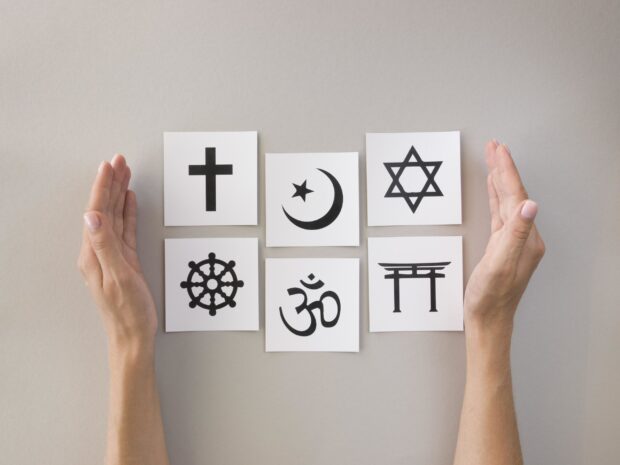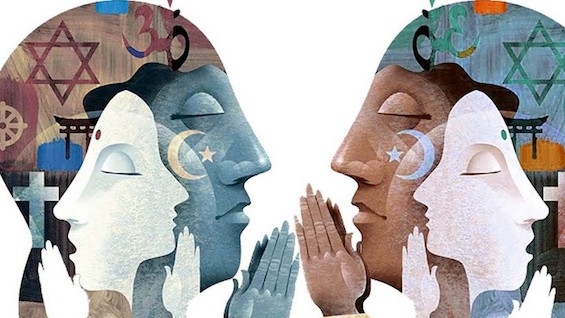Religions as transformative sources of peace
According to the latest Global Peace Index (2024)[1] the number of active conflicts to date – 56 in 2022 – is the highest since World War II, with clashes increasingly internationalized – 92 countries are involved in conflicts outside their borders. The index suggests that the world has become less stable in recent years, with increases in political instability, the number of wars, confrontations-related deaths and violent demonstrations.
Fortunately, at the same time that conflicts and the damage they cause are increasing, the number of actors trying to resolve them and consolidate peace processes is also on the rise. Among these actors, the most recognized are states or international organizations such as the United Nations. However, there are other actors who, although lacking the official status of the former, have the power to influence the establishment and maintenance of peace. Among them, religions stand out, on which we will focus in this text.
At the same time that conflicts and the damage they cause are increasing, the number of actors trying to resolve them and consolidate peace processes is also on the rise.
There is a tendency in the social imaginary, especially in more secular societies, to mistakenly link religions with violence and conflict. However, this is nothing more than a prejudiced belief stemming from a lack of understanding of the roots of conflicts, as well as a general ignorance of religions. There is no evidence between the presence or absence of religious beliefs and conflict. A statistical analysis by the Institute for Economics and Peace found that of the 10 most peaceful countries, 3 were highly religious, while of the 10 least peaceful, 2 were among the least religious, therefore the absence of religion does not imply more peaceful societies [2]. This analysis revealed that factors such as corruption, political instability and terror, economic inequality or inequality of any kind are far more important determinants of the drivers of violence and conflict than the presence of religious beliefs. In fact, what was found was that those countries with greater membership of religious groups tended to be slightly more peaceful, while countries with less religious diversity tended to be less peaceful [2].
Another observation is that the most peaceful countries are those associated with the highest degrees of religious diversity and freedom, which includes both formal laws guaranteeing basic rights and freedoms and informal social and cultural norms related to the behavior of the citizens [2]. This is a challenge, especially for more secular societies, to open up to the opportunities that religious plurality can bring to society.
Religions contribute to building social cohesion, which can strengthen ties between citizens and strengthen the bonds of peace.
According to the database of the Religion and Nonviolent Action Project (RNVA) of the US Institute of Peace (USIP) [3], more than half of all non-violent campaigns since World War II have had some kind of religious component. Different religious actors engage with conflict resolution and peace in various ways: mediating roles in confrontations, promoting reconciliation, mobilizing communities for peace, supporting those affected, participating in various activities, etc.[4]
Understanding the importance of religious beliefs and peacekeeping requires an understanding of the strong influence of religious actors. Spiritual leaders are authority figures with a prestige missing from any other lay actor, as they have strong roots and links to communities. Religions contribute to building social cohesion, which can strengthen ties between citizens and strengthen the bonds of peace [2]. In addition, religions sometimes have organizations or structures from which it is easier to develop activities and channel support for peacebuilding. The support of religious institutions can even double the chances of achieving peace [5].
Another crucial aspect of understanding the importance of religion’s pacifying role is spiritual values, which are a source of constructing cultural norms from which particular conceptions of the most transcendental aspects of human life are derived. While each religion has its own norms and principles, they all share an aspiration to live in a peaceful, harmonious and coexisting world.
Religion has a direct impact on the conceptualisation of peace as it develops its moral and ethical principles.
Considering the particular case of Islam, due to the great importance of religion in Muslim societies, it is easy to understand why religion has a direct impact on the conceptualisation of peace as it develops its moral and ethical principles [4]. Islam is a religion of peace. The word Islam itself shares the root ‘isalm’ with the Arabic word for peace, ‘salaam’. An analysis of the official sources of Islam, the Qur’an and the Hadith (or traditions attributed to the Prophet Muhammad), reveals a number of principles that could be useful not only for resolving existing conflicts, but also for gaining greater stability in all circumstances and contexts. Some of these are: Tawhid (‘Unity of God’), social and individual morality, equality, justice, tolerance, pluralism and a long etcetera. On the whole, the original sources of Islam are replete with messages that push towards the control of the more conflicting impulses, such as selfishness, violence or arrogance, for example, and the expansion of the better ones, such as compassion or forgiveness, among others.
In this way, if one leaves aside the Islamophobic gaze, the discourses of hate and differentiation, it would be possible to see in Islam a potential source of inspiration that seeks, like other religions, a reflection towards the resolution of conflicts and the construction of more cohesive and peaceful societies that look after the well-being of all people and the environment.
Undoubtedly, there are other factors that come before religion in the maintenance of peaceful societies, such as economic equality, individual, social and environmental well-being or political stability, among others. Even so, it is important to recognize the positive role that religions can play as transformative sources of peace, as their institutions, organizations and representatives can play a key role in facilitating peace processes in different places and contexts.
Notes
[1] Institute for Economics & Peace (2024). Global Peace Index 2024. Retrieved from: https://www.economicsandpeace.org/
[2] Institute for Economics & Peace (2014). Five key questions answered on the link between Peace & Religion. Retrieved from: https://www.economicsandpeace.org/wp-content/uploads/2015/06/Peace-and-Religion-Report.pdf
[3] Klocek, J. (2024). Religion and Nonviolent Action (RNVA) Dataset. Harvard Dataverse. Retrieved from: https://doi.org/10.7910/DVN/FKVA0G
[4] Bouta, T., Kadayifci-Orellana, S.A. & Abu-Nimer, M. (2005). Faith-Based Peace-Building: Mapping and Analysis of Christian, Muslim and MultiFaith Actors, The Hague, Clingendael; Washington, DC, Salam Institute for Peace and Justice. Retrieved from: https://www.clingendael.org/publication/faith-based-peace-building-mapping-and-analysis-christian-muslim-and-multi-faith-actors
[5] Klocek, J., Rivers, M. & Tombe, S. (2021). New Evidence: How Religion Aids Peaceful Change. United States Institute of Peace, Retrieved from: https://www.usip.org/publications/2021/09/new-evidence-how-religion-aids-peaceful-change

















No Comments